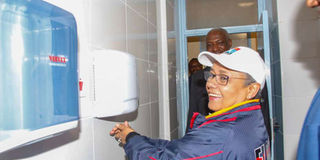Use of hand dryers poses a health hazard, say experts

First Lady Margaret Kenyatta tests a hand dryer at Kenyatta University, Nairobi, last year. Experts have warned that warm air dryers are unsuitable for use since they may contribute to cross-infection via airborne dissemination. PHOTO | FILE
What you need to know:
According to a study done by British researchers, hand dryers could infect people standing nearby when another person is using it.
According to the Health ministry, drying hands with a paper towel will reduce the bacteria count by 45 to 60 per cent as opposed to using a hand dryer, which will increase it by 255 per cent
According to a research published in the Journal of Hospital Infection Thursday, air-blown hand dryers in public rest rooms may spread far more germs than conventional paper towels.
Are you fond of using a hand dryer after visiting the washroom? Then, you need to be careful.
Experts have warned that warm air dryers are unsuitable for use since they may contribute to cross-infection via airborne dissemination.
According to a study done by British researchers, hand dryers could infect people standing nearby when another person is using it. Worryingly, they tend to spray the most bacteria — up to almost a metre from the floor, the study shows.
“When paper towels were used for hand drying, no dispersal of bacteria was found but hand dryers spray bacteria all over the room,” said the study.
According to the Health ministry, drying hands with a paper towel will reduce the bacteria count by 45 to 60 per cent as opposed to using a hand dryer, which will increase it by 255 per cent.
The study sought to find out the risk of bacteria being spread in the air when drying hands after visiting the toilet.
UNHYGIENIC
Dr Amos Otedo, a Kisumu physician, said: “Using a hand dryer after washing your hands is so unhygienic that it might be better to not wash at all.”
He said the moisture left after partially drying hands with an electric dryer makes the spread of bacteria more likely.
Previous research has shown that usually after visiting the toilet a person has around 200 million bacteria per square inch on each hand. And hands contaminated with bacteria can transfer them to five more surfaces or 14 other subjects, research shows.
According to a research published in the Journal of Hospital Infection Thursday, air-blown hand dryers in public rest rooms may spread far more germs than conventional paper towels.
PATHOGEN SPREAD
“The efficiency of hand drying is important in preventing pathogen spread, but knowledge surrounding which drying methods contribute least towards contamination of the environment and users is limited,” said Mark Wilcox, of the University of Leeds in the UK.
To compare three common hand-drying methods (jet-air and warm-air dryers, and paper towels) in contaminating the environment, users and bystanders, the investigators placed a bacteria specimen on the hands of volunteers.
Airborne bacteria levels were measured to determine the efficacy of the three methods. “Bacteria levels in the air around jet-air dyers were four-and-a-half times higher than warm-air dryers and 27 times higher than the air around paper towel dispensers. The bacteria persisted in the air around hand dryers long after they were used,” said the study.




